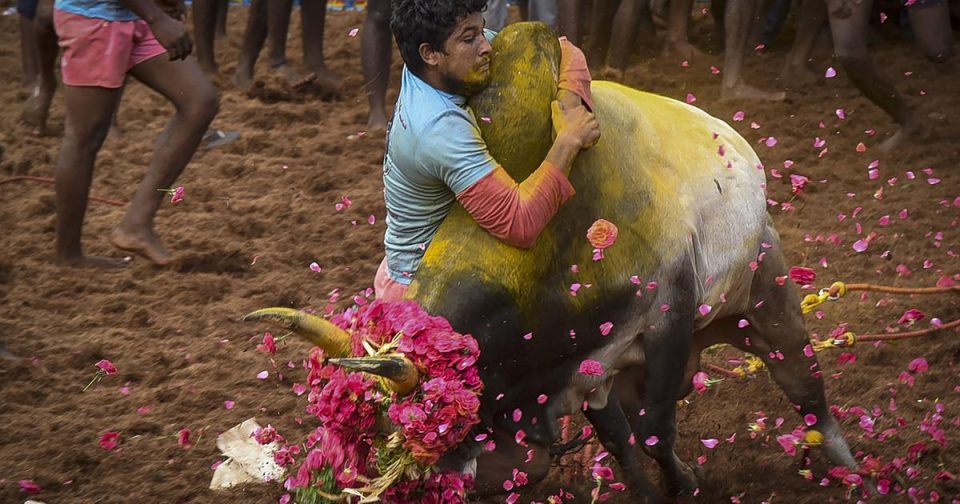The Supreme Court on May 18 allowed Jallikattu, which originated in Tamil Nadu, to proceed, upholding the state’s law that exempted the sport of cattle taming from the Prevention of Cruelty to Animals Act 1960 on cultural and traditional grounds.
While the court’s constitutional bench said Jallikattu has been played in Tamil Nadu for centuries, whether it is part of the state’s cultural traditions must be debated in parliament, not in court.
The Supreme Court also upheld laws in the states of Karnataka and Maharashtra allowing Kamabala and bullock cart racing.
Usually held during the Pongal festival in January, Jallikattu is said to have originated in Tamil Nadu between 400 and 100 BC. A native breed of a bull is released into the crowd, and participants attempt to use their arms to grab the hump on the bull’s back and hold the animal as it tries to escape.
Participants grab the hump to try to stop the animal. In some cases, participants have to ride for a long time to remove the flags tied to the horns.
In 2014, two Supreme Court judges outlawed Jallikattu, saying it violated the Prevention of Cruelty to Animals Act.
The court said the practice was cruel and caused pain and suffering to the animals. Despite the many efforts of the Tamil Nadu government, the court’s injunction cannot be revoked.
In 2016, the Centre effectively rescinded the ban by issuing notices exempting performance programs that could not use bulls. However, the Supreme Court dismissed the notice, upholding the injunction.
In 2017, protests against the ban spread across Tamil Nadu, causing a policing situation. The Center subsequently passed the Prevention of Cruelty to Animals (Tamil Nadu Amendment Act) Act 2017 and the Prevention of Cruelty to Animals (Jallikattu Act) Rules 2017, allowing Jallikattu to become part of the state’s culture and traditions.
The act was challenged in the Supreme Court and brought before the Constitutional Court in 2018. The case was refrigerated for four and a half years before a constitutional court headed by Justice KM Joseph was formed to hear the case.
The case was argued in November and December 2022, with lawyers for the Animal Rights Committee arguing that a movement that causes harm to animals and violates the Prevention of Cruelty to Animals Act cannot be legitimized in the name of culture and heritage.
They argue that Jallikattu can be harmful to both bulls and humans. According to the Tamil Nadu government, Jallikattu is a religious and cultural phenomenon celebrated by Tamils all over the world, across castes and creeds. Jallikattu is a symbol of community identity. The court reserved the December 2022 order.
 Live
Live

